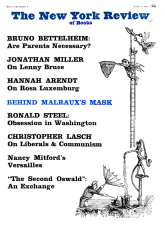In response to:
Devaluations from the September 8, 1966 issue
To the Editors:
My belief in critical objectivity disqualifies me from judging my writing or from taking issue with a hostile judgment of it, such as D. J. Enright’s review of my Refractions: Essays in Comparative Literature (September 8). Since he attests his allegiance to F. R. Leavis, about whose influence I have expressed some reservations, our differences of opinion would seem to be quite natural.
But we do not really differ about the primary importance of understanding the individual literary work. Not unfairly, Mr. Enright emphasizes my further concern for the larger continuities of literature. Jumping to the conclusion that I am therefore unconcerned with literature in depth, he supports it with quotations taken out of context, including a single sentence about James Joyce from an essay sketching the history of literary exile. Having elsewhere written extensively and in detail about Joyce, having indeed devoted a little book to him at a time when he was slighted by most English critics, I had hoped I might mention him in passing without the imputation of taking a superficial interest.
Since there is a statement in my preface to which Mr. Enright has paid no attention, may I be allowed to quote it here? Describing the relation of Refractions to my previous books, I ventured to say: “Insofar as they have been studies in depth, concentrated interpretations of writers and their works, perhaps they have earned me the privilege of ranging more broadly and generalizing more freely in this book.” Clearly they have not, in Mr. Enright’s view. But I am constrained to believe that his refusal to accord such a privilege is one of the issues between the Leavisites and students of comparative literature.
Harry Levin
Wellfleet, Massachusetts
D. J Enright replies:
I was not discussing the Whole of Harry Levin but Refractions: Essays in Comparative Literature, and I took the opportunity to voice doubts about “the discipline of comparative literature”—doubts (surely not exclusively Leavisian, or Leavisite?) which the book seemed to me to intensify. I acknowledged Mr. Levin’s learning, but remarked on the superficiality of much of this collection of papers. The quotations could hardly not be taken out of context. But does the sentence about Joyce become more meaningful because Mr. Levin has devoted a book to that author? “Privilege” is a thing which I doubt any writer can rely on!
This Issue
October 6, 1966



